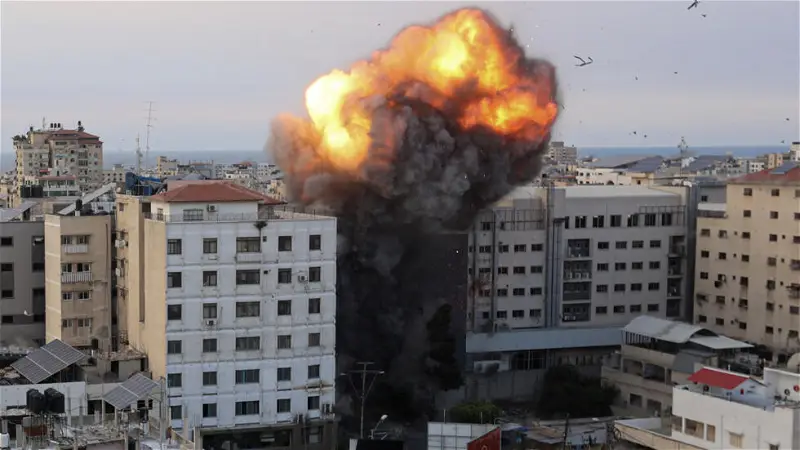Israel pressed its Gaza offensive Saturday, with Hamas authorities reporting heavy shelling in several cities hours after world powers demanded more aid be allowed into the besieged Palestinian territory.
The Hamas-controlled health ministry said 18 people were killed in a strike on a house in Nuseirat refugee camp in central Gaza, as other targets were hit up and down the strip.
The Israeli army said late Friday it had destroyed a “strategic” tunnel complex, a “Hamas headquarters and eliminated terrorists” in operations in Gaza City, where its forces have been locked in street-to-street fighting with Hamas gunmen
The health ministry in Gaza, which the Islamist movement Hamas has ruled since 2007, said more than 400 people had been killed in Israeli bombardments over 48 hours.
The latest violence comes after the UN Security Council approved a resolution demanding “immediate, safe and unhindered” deliveries of life-saving aid be rushed to Gaza “at scale”.
The resolution was passed after members wrangled for days over its wording.
At Washington’s insistence, the Security Council watered down some provisions, and avoided calling for a ceasefire that would stop the 11-week-old war, which began with Hamas’s bloody raids into Israel on October 7.
It is still unclear what, if any, impact the vote will have on the ground.
UN Secretary-General Antonio Guterres said a ceasefire was still needed, arguing aid could not be adequately delivered while the bombs were falling.
“The way Israel is conducting this offensive is creating massive obstacles to the distribution of humanitarian aid,” he said.
Famine looms
Immediately after the UN vote, Israel vowed to continue its air and ground assault on the Gaza Strip until Hamas is “eliminated” and hostages still being held in the territory are freed.
“Israel will continue the war in Gaza,” said Foreign Minister Eli Cohen, insisting the war was legal and just.
ADVERTISEMENT
But pressure is growing on Israeli authorities to recalibrate the Gaza offensive.
The war began on October 7 when Hamas gunmen broke through Gaza’s militarised border and killed about 1,140 people in Israel, mostly civilians, according to an AFP tally based on Israeli figures.
Palestinian militants also abducted about 250 people, 129 of whom remain in Gaza, according to Israeli authorities.
Vowing to destroy Hamas, Israel launched a relentless bombardment and ground invasion of Gaza, where 20,057 people have been killed, mostly women and children, according to the territory’s Hamas government.
With swathes of Gaza reduced to rubble, many Gazans have been forced into crowded shelters or tents, and are struggling to find food, fuel, water and medical supplies.
Israeli soldiers refuel a tracked vehicle at a position near the border with the northern Gaza Strip in southern Israel on December 19, 2023, amid the ongoing conflict between Israel and the Palestinian militant group Hamas. (Photo by Menahem Kahana / AFP)
The United Nations estimates the fighting has displaced almost 80 percent of Gaza’s 2.4 million population.
World Health Organization chief Tedros Adhanom Ghebreyesus warned a majority of those uprooted from their homes were now going “entire days and nights without eating”.
“Hunger is present, and famine is looming,” he said.
‘Massive obstacles’
Hopes for a Christmas-time truce dim with each passing day, although talks brokered by Qatar, Egypt and the United States are ongoing.
A one-week truce that ended on December 1 saw 105 hostages released from Gaza captivity, including 80 Israelis in exchange for 240 Palestinian prisoners.
“This is not a life: no water, no food, nothing,” said wheelchair-bound Walaa al-Medini, who is now in the Bureij refugee camp, in central Gaza, after a strike on her home in Gaza City.
“My daughter died in my lap, and I was rescued from under the rubble after three hours,” she said. “Our house, along with everything around us, was destroyed.”
Friday’s much-delayed UN resolution came after days of diplomatic bickering, and only passed thanks to US and Russian abstentions.
It gives the United Nations a bigger role in coordinating the delivery of aid to Gaza.
But Israel’s foreign minister insisted his country would retain control of what goes into Gaza and “will continue to screen all humanitarian aid to Gaza for security reasons”.
Hamas described the resolution as “an insufficient measure that does not respond to the catastrophic situation created by the Zionist (Israeli) war machine”.
According to the UN, the number of aid trucks entering Gaza is well below the daily pre-war average.







